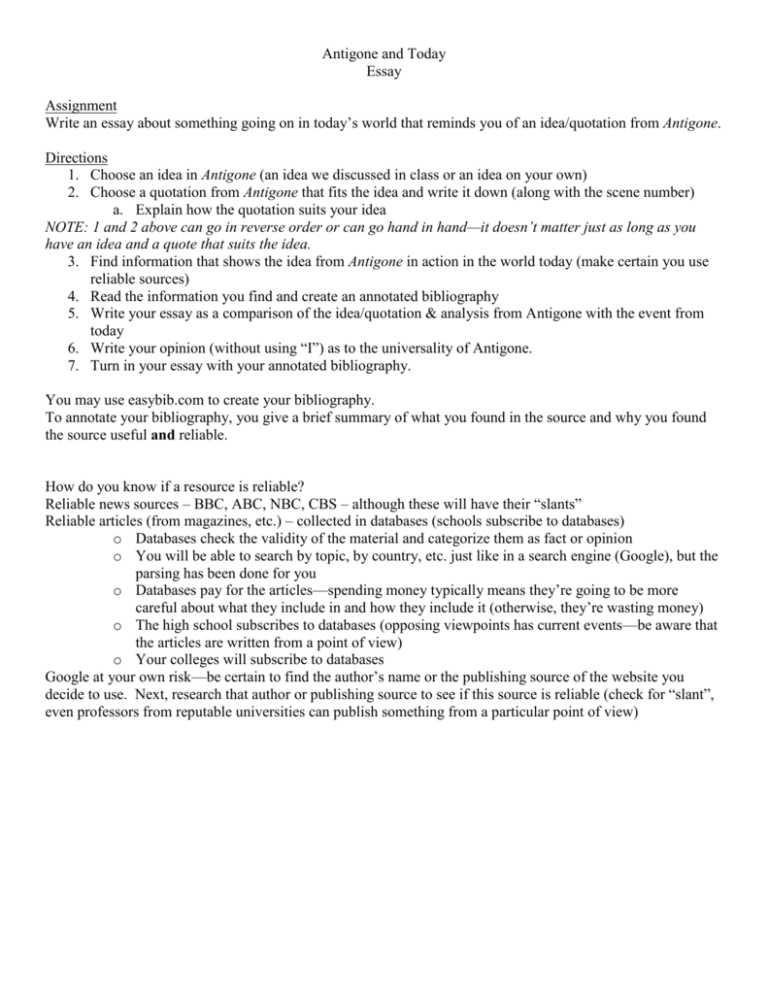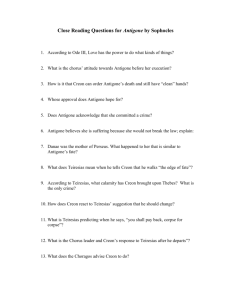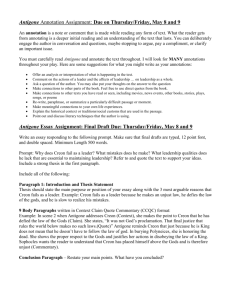Assignment sheet with Quotations and Outline
advertisement

Antigone and Today Essay Assignment Write an essay about something going on in today’s world that reminds you of an idea/quotation from Antigone. Directions 1. Choose an idea in Antigone (an idea we discussed in class or an idea on your own) 2. Choose a quotation from Antigone that fits the idea and write it down (along with the scene number) a. Explain how the quotation suits your idea NOTE: 1 and 2 above can go in reverse order or can go hand in hand—it doesn’t matter just as long as you have an idea and a quote that suits the idea. 3. Find information that shows the idea from Antigone in action in the world today (make certain you use reliable sources) 4. Read the information you find and create an annotated bibliography 5. Write your essay as a comparison of the idea/quotation & analysis from Antigone with the event from today 6. Write your opinion (without using “I”) as to the universality of Antigone. 7. Turn in your essay with your annotated bibliography. You may use easybib.com to create your bibliography. To annotate your bibliography, you give a brief summary of what you found in the source and why you found the source useful and reliable. How do you know if a resource is reliable? Reliable news sources – BBC, ABC, NBC, CBS – although these will have their “slants” Reliable articles (from magazines, etc.) – collected in databases (schools subscribe to databases) o Databases check the validity of the material and categorize them as fact or opinion o You will be able to search by topic, by country, etc. just like in a search engine (Google), but the parsing has been done for you o Databases pay for the articles—spending money typically means they’re going to be more careful about what they include in and how they include it (otherwise, they’re wasting money) o The high school subscribes to databases (opposing viewpoints has current events—be aware that the articles are written from a point of view) o Your colleges will subscribe to databases Google at your own risk—be certain to find the author’s name or the publishing source of the website you decide to use. Next, research that author or publishing source to see if this source is reliable (check for “slant”, even professors from reputable universities can publish something from a particular point of view) Quotations from Antigone (A demonstration just to consider) Choragos: “…Leave the future to itself.” (Exodos, p.244) – Choragos makes this comment to Creon when Creon wishes for death to come to him at witnessing/causing the deaths of his wife and son. Choragos means that death will come when it comes—humans should have no control over that (suicide is the wrong way to go—let the fates unravel, measure and cut your time themselves). This can be discussed as a real-world application. This quotation, however, can be taken out of context as an inspiration to different real-world application. One possible application: should we only focus on the here and now without looking to the future (positives from this view point: rapid technological advancements, rapid human advancements; negatives from this view point: advanced climate changes, increased wealth gap, increased corruption) Choragos: “That is the truth; but you were late in learning it.” (Exodos, p.242) – Choragos speaks this Creon who is confused that he ended up losing his wife and son in spite of taking responsibility for what he did wrong. Creon: “I will not fight with destiny.” (Scene V, p. 235) – Creon has changed his mind about Antigone and Polyneices since he now believes Teiresias’s prophecy. He has yet to admit he was wrong, however (that comes in the next scene when he sees the aftermath of his actions). Teiresias: “All men make mistakes, but a good man yields when he knows his course is wrong, and repairs the evil. The only crime is pride.” (Scene V, p. 232) – Teiresias warns Creon of his crime and the consequences. Creon: “…our hands are clean.” (Scene IV, p. 227) – Creon decides to lock Antigone away in a cave rather than kill her outright. He will leave her little food and then the rest of her life is up to her (according to him). Haimon: “But if I am young, and right, what does my age matter?” (Scene III, p. 320) – Haimon tries to convince his father, Creon, to listen to his advice about freeing Antigone and listening to people of Thebes about how to best rule/run the city. Creon: “Is a woman stronger than we?” (Scene III, p. 218) – Creon asks this (rhetorical) question of Haimon and Choragos as he makes his case for sentencing Antigone to the cave and going against popular opinion. Creon: “Whoever is chosen to govern should be obeyed—must be obeyed, in all things, great and small, just and unjust!” (Scene III, p. 217) – Creon explains how a leader must be followed in order to persuade his son to his side of the Antigone issue. Antigone: “It is my nature to join in love, not hate.” (Scene II, p. 211) – Antigone’s reason for burying her brother Polyneices was her love for him as her brother and not out of spite or defiance against a tyrant king (Creon). Sentry: “Are you sure that it is my voice, and not your conscience?” (Scene I, p. 202) – the sentry asks this of Creon when Creon tries to get to the sentry to stop telling him what is wrong by saying the sentry’s voice is distressing (the sentry wonders if it is Creon’s conscience about doing the wrong thing by not burying Polyneices that is bothering him—that Creon is basing his rule on terror rather than on what is right).








